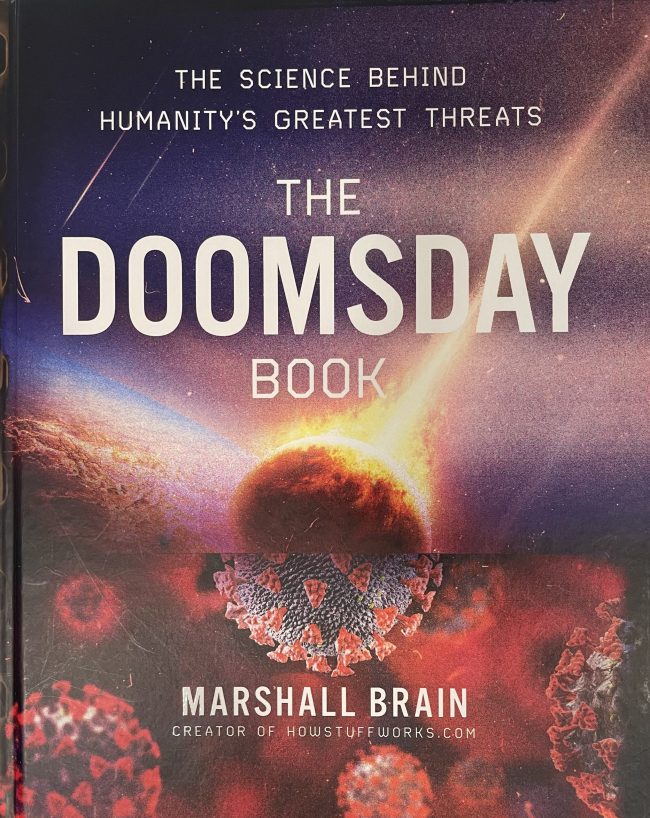
Media we love: The Doomsday Book
Kelly Kizer Whitt recommends The Doomsday Book
In The Doomsday Book, Marshall Brain, the creator of HowStuffWorks.com, presents us with 25 scenarios that could destroy a city, country or the world. He divides his book into three parts: man-made disasters, natural disasters and science fiction made real.
Brain eases into the catastrophes to come with a quirky scenario that he calls “Splitting the United States in Half”. It details a situation I’d never head of before. In Montana is a lake called Ft. Peck held back by a massive earthen dam. He explains how, if the dam failed, the water rushing downstream would take out one dam after another until a tremendous wall of water would wash away Kansas City, among others, before finding its way to the Gulf of Mexico. The mass of water would wipe out all the bridges and train trestles, cutting the western half of the United States off from the eastern half.
For every scenario, Brain reviews the science behind it and possible preventions, when there are any. Some of the other topics in man-made disasters include EMP attacks, runaway global warming, pandemics and biological attacks, and the opioid crisis.
Natural disasters
Then Brain moves onto natural disasters, the kind you’ve seen in epic and not-so-epic disaster movies. Among the topics are asteroid strikes, supervolcanoes, earthquakes, supertsunamis, coronal mass ejections, hurricanes and more. The ocean acidification chapter felt especially prescient as I read it in the spring of 2023. Sea-surface temperatures have shot to record highs the past couple months. About 1/3 of the carbon dioxide from burning fossil fuels dissolves in the ocean. The carbonic acid created makes the oceans more acidic, and an ocean pH of 7.8 may be the tipping point to cause a massive die-off of marine life. As the book states:
At least 50% of the oxygen in the Earth’s atmosphere comes from plankton and algae in the ocean. If we allow ocean acidification to kill off the plankton, the situation could become dire for humans and other land animals when oxygen levels in the atmosphere decline.
Science fiction made real
In the final section, science fiction made real, Brain examines a robot takeover, alien invasion and gray goo. But my favorite topic (if you can say that about Doomsday scenarios) was the Relativistic Kill Vehicle (RKV).
In case you, too, had never heard of this concept before, here’s a quick overview. An alien civilization shoots an object toward us at near the speed of light. The vehicle doesn’t even have to be large. An object just a foot or two in diameter moving at just half the speed of light (93,000 miles per second) would be disastrous. So, for example, a baseball moving at that speed would have the kinetic energy of 25 times the Hiroshima bomb. A RKV the size of a telephone pole (30 feet by 1 foot) and made of uranium traveling at that same speed would have the energy of 9 million Hiroshima bombs.
Of course, the aliens would have to be pretty good at math to shoot an object from a great distance at a small, moving object (Earth). Just for fun I looked into our own space probes to see if they could be RKVs for other planets they encounter. Voyager 1, the faster of the two Voyager spacecraft, is currently moving at about 10 miles per second. So, while incredibly fast (and destructive if it hit somewhere), maybe not in the range of an RKV.
Bottom line: In this installment of Media we love, EarthSky editor Kelly Kizer Whitt recommends The Doomsday Book.











